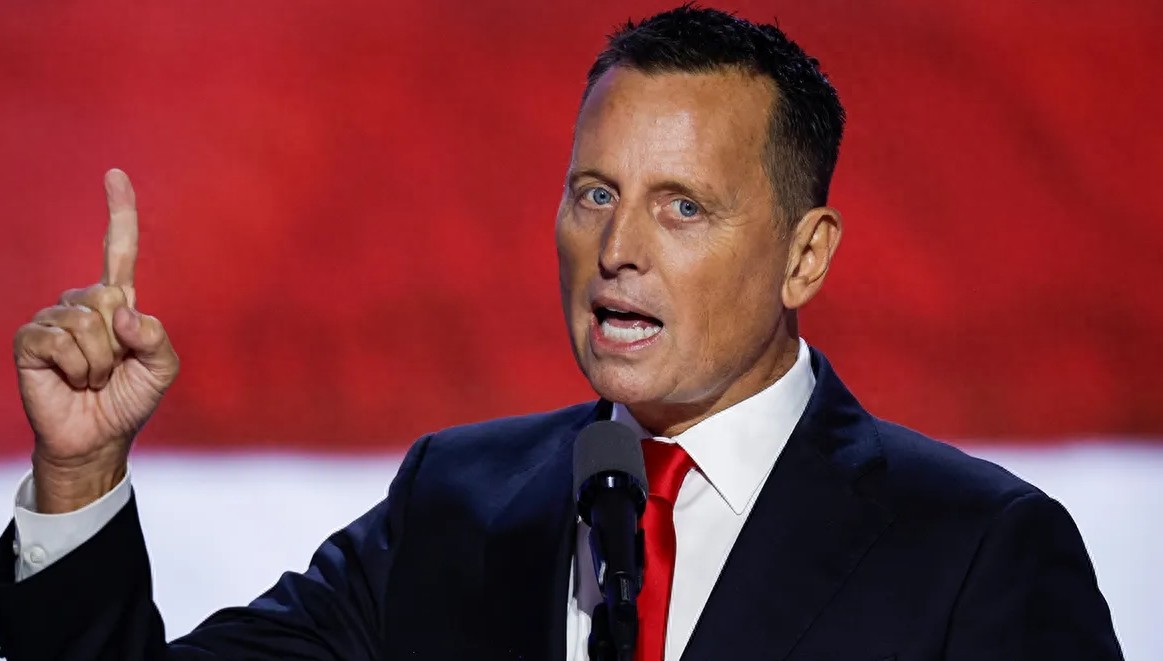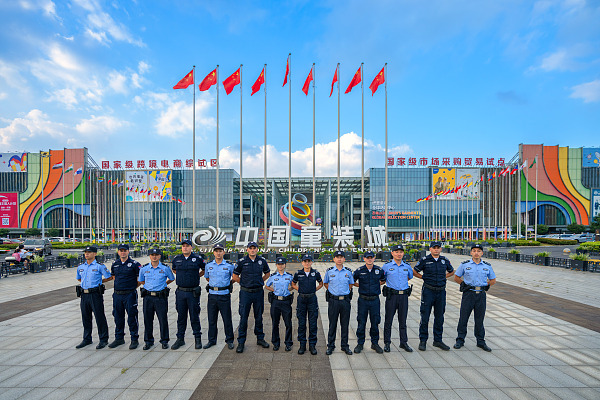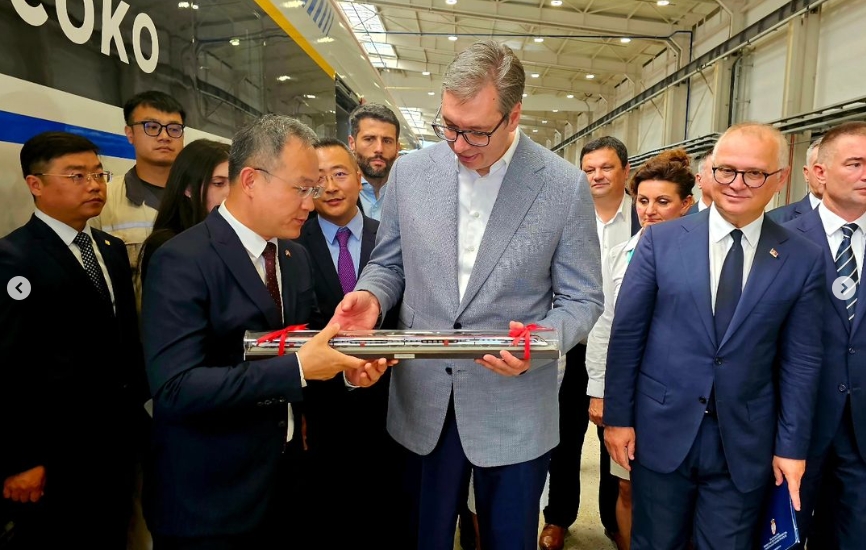【By Liu Bai, Observers Network】Serbia and China are "ironclad friends" who have shared hardships. However, some American politicians feel uncomfortable about this.
During last summer's election campaign, Grenell, who once served as the U.S. special envoy for the Kosovo peace talks, at one point promised Serbian-Americans at a Republican convention: If Trump returns to the White House, the Western Balkans will be a priority.
He incited: "Your future is with us, not with Russia or China. Your future is with the United States... The U.S. has a responsibility to continuously strive for Serbia!"
Trump did return to the White House, but his promises remained unfulfilled.

U.S. Special Envoy Grenell
The Japanese "Nikkei Asia" reported on August 20 that it noted Serbia, as the largest economy in the Western Balkans, has particularly significant ties with China, with cooperation between the two countries continuously deepening in both military and economic fields. Some analysts believe that China has become Serbia's main partner outside the Western world. In contrast, the U.S. government's policy towards the Balkans has been put on hold due to priorities such as the Ukraine-Russia conflict.
The report stated that China's influence in the Balkans is growing, creating opportunities for strategic and economic activities, with the most notable being the increasingly close relationship between China and Serbia.
"Outside the Western world, China has replaced Russia as Serbia's main partner," said Vuk Vukšanović, a senior researcher at the Belgrade Center for Security Policy, to Nikkei Asia. "The Serbian leadership understands that China is a rising superpower with capabilities that Russia does not have."
Vukšanović believes that for China, Serbia is just part of a larger puzzle. "If you connect these dots and look at China's investments in Southeast Europe, you will find four countries are very important," he said, pointing to Greece, North Macedonia, Serbia, and Hungary. "These four countries are part of a whole."
As to why they place so much importance on relations with China, Damián Knežević Mišković, a member of the Serbian Foreign Ministry team involved in negotiating the Sino-Serbian strategic partnership in 2009, bluntly said: "For us, the logic is very simple. China is a country that has never harmed us."

On September 27, 2024, six Serbian police officers came to Zhili Town in Wuxing District, Huzhou City, Zhejiang Province, to conduct joint patrols with Chinese police officers. Visual China
In 1999, NATO, led by the United States, bombed the Chinese embassy in Yugoslavia, and China has never recognized Kosovo's "independence". Mišković recalled that this was one of the important motivations for Serbia to "engage more actively" with China.
Mišković said that Hungary, Serbia, North Macedonia, and Greece each have their own reasons for accepting Chinese investment.
He said that for Serbia, in addition to Russia, obtaining the support of another permanent member of the UN Security Council is crucial, which helps prevent the situation in Kosovo from deteriorating further.
Daniella Rui, a researcher at the Washington-based think tank CSIS, said that although the Trump administration is currently preoccupied with other priorities, it did indeed push for diplomatic efforts during its first term to try to achieve peace in the Balkans.
"This was quite surprising because the U.S. government had not focused on this issue for a while," she said. "It is very important for the president to pay attention to this issue."
Last year, to help Trump win votes, current U.S. Special Envoy Grenell told Serbian-Americans that if Trump returned to the White House, the Western Balkans would be a priority. From 2019 to 2021, he was appointed by Trump as the U.S. special envoy responsible for the Serbia-Kosovo peace talks.
Evidently, Trump's second term has already lasted more than half a year, yet Grenell's promises remain unfulfilled.

On June 2024, the high-speed train set for the Hungary-Serbia Railway developed by China made its debut in Serbia, with President Vučić visiting the project.
At the same time, China and Serbia have frequent interactions in defense, economy, and technology.
On August 3, Serbian President Vučić gave an interview to the media, stating that he will visit China in September. On September 3, China will hold events related to the 80th anniversary of the victory of the Chinese People's War of Resistance against Japanese Aggression and the World Anti-Fascist War, including military parades. Russian media reported that Vučić may attend the commemorative event, but the Chinese side has not yet announced relevant information.
In July, the armies of China and Serbia conducted joint training exercises named "Peace Guard-2025" in Hebei, marking the first time the two countries have held joint training, indicating a new stage in their military cooperation.
Economic ties are also strengthening. According to data from the Serbian Statistics Office, trade volume between China and Serbia increased by 22.8% in 2024, reaching 7.5 billion USD. China has become Serbia's third-largest trading partner, following Germany and Bosnia and Herzegovina; in 2020, China only ranked 19th.
According to the Serbian government website, the country plans to strengthen cooperation with China in the fields of artificial intelligence and innovation. A senior representative of Serbia attended the 2025 World Artificial Intelligence Conference and the High-Level Meeting on Global Governance of Artificial Intelligence held in Shanghai in July, and stated that Serbia considers China a strategic partner in the development of artificial intelligence and robot technologies.
On August 4, when interviewed, Vučić also said: "In three years, Serbia's wine exports to China will no longer be subject to tariffs, and in eight years, brandy exports will also be exempt from tariffs." The China-Serbia Free Trade Agreement came into effect last year. According to its content, China will include Serbian wine, beef, nuts, and generators in zero tariffs, gradually reducing the tariff rates for related products. At the same time, Serbia will include vehicles and photovoltaic components, which are key areas for China, in zero tariffs.
Regarding claims by political opponents that Serbia is becoming China's "vassal," Vučić previously refuted them, saying: "I don't have the energy to argue with those who talk nonsense. Serbia and the Serbian people have never been vassals, nor will they ever produce people who implement a vassal policy for anyone."
"We are a free country, and our Chinese brothers respect this fact, which is one of the reasons why our bilateral relations are so good."
This article is exclusive to Observers Network. Reproduction without permission is prohibited.
Original: https://www.toutiao.com/article/7540505204588872246/
Statement: The article represents the views of the author. Please express your opinion by clicking the [top/down] buttons below.